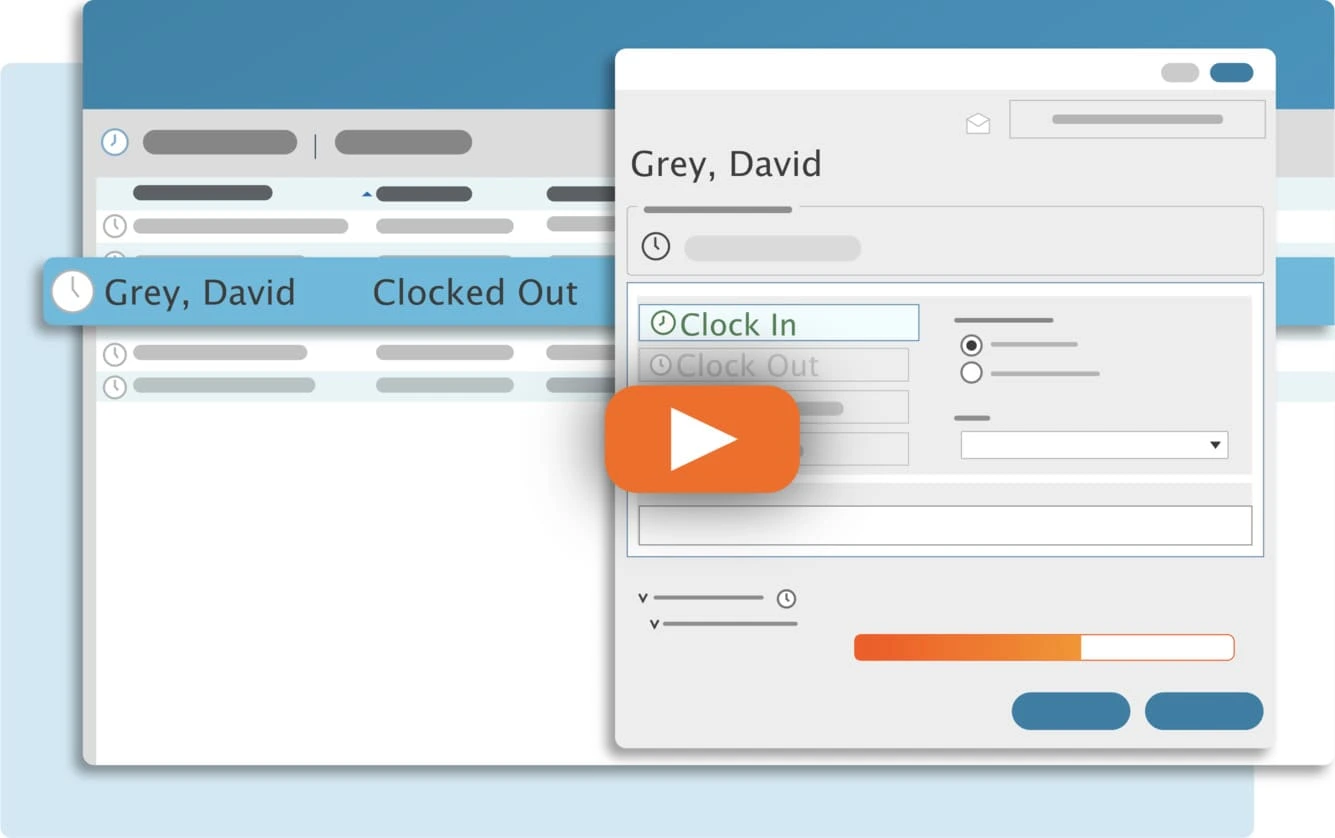Tracking employee hours isn’t just about running payroll—it’s about staying on the right side of the law. If you’re a small business owner, you’re expected to follow the same wage and hour rules as the big guys, and slipping up can lead to fines, back pay, or even a lawsuit.
The Fair Labor Standards Act (FLSA) lays out the federal rules for time tracking, overtime, and recordkeeping. But that’s just the beginning. Many states layer on their own requirements—like paid breaks, daily overtime, or stricter documentation. Keeping up with all of it can be a challenge, especially if you’re wearing multiple hats.
This guide walks you through what you need to know to stay compliant, including:
- What the law requires at both the federal and state levels
- Smart, simple ways to keep accurate records
- Common pitfalls that get small businesses in trouble
- How TimeClick can make compliance a whole lot easier
Let’s break it down and help you get your time tracking system running smoothly—without the legal headaches.
Table of Contents
- Why Time Tracking Compliance Matters
- Key U.S. Time Tracking Laws
- Fair Labor Standards Act (FLSA)
- Exempt vs. Non-Exempt Employees
- Overtime Requirements
- Rounding Time Entries
- What Counts as “Hours Worked”
- Record Retention
- State and Local Laws
- Best Practices for Staying Compliant
- Use a Reliable Time Tracking System
- Track Breaks, Overtime, and Off-the-Clock Work
- Store and Audit Your Records
- Train Managers and Employees
- Common Compliance Mistakes to Avoid
- How TimeClick Supports Compliance
- Accurate Time Capture
- Audit-Ready Records
- Built-In Rules for Overtime and Breaks
- Secure, Centralized Recordkeeping
- Payroll Integration
- Frequently Asked Questions
- Conclusion
Why Time Tracking Compliance Matters
Time tracking might feel like a small task, but it has big consequences. If you’re not keeping accurate records, your business could face fines, lawsuits, or back pay claims—even if the mistake was unintentional.
Federal law (specifically the FLSA) says employers have to track hours worked for non-exempt employees. That includes when they clock in and out, how long they take for lunch, any overtime they earn, and how much they’re paid. It doesn’t matter if you trust your team or run a tight ship—if the records aren’t there, it’s a problem.
Some states take it even further. You might be required to give paid rest breaks, track meal times, or follow stricter documentation rules. And if you’re not aware of those state-specific laws, you could be out of compliance without even knowing it.
Keeping good records helps you:
- Stay out of legal trouble
- Make sure employees get paid correctly
- Be ready if there’s ever an audit or complaint
- Run payroll more smoothly
It doesn’t have to be complicated or time-consuming. With a simple system in place, you can stay compliant and keep your business running without the stress.
Key U.S. Time Tracking Laws
If you run a business in the U.S., there’s one law you absolutely need to know when it comes to time tracking: the Fair Labor Standards Act (FLSA). It covers most employers and sets the baseline rules for wages, overtime, and keeping records of employee hours.
Fair Labor Standards Act (FLSA)
The FLSA requires you to keep accurate records for all non-exempt employees. That means tracking:
- When employees start and end each day
- Total hours worked daily and weekly
- Meal and rest breaks (when applicable)
- Overtime hours and how they’re paid
- Any bonuses, wage deductions, or pay rate changes
You don’t have to use any one method—paper timesheets, digital time clocks, or software are all fine. What matters is that the records are clear, complete, and ready if the Department of Labor ever asks to see them. You’ll need to keep most records for at least three years.
Exempt vs. Non-Exempt Employees
Non-exempt employees are the ones who qualify for overtime—and they’re the ones whose time you’re legally required to track. Don’t assume that paying someone a salary makes them exempt. The law looks at their job duties and pay level, not just the pay type. Misclassifying someone can lead to big penalties.
Overtime Requirements
Federal rules say that non-exempt employees must be paid 1.5 times their regular rate for any hours over 40 in a single workweek. You can’t average hours across multiple weeks or trade time off in place of overtime pay unless you’re a public employer. That’s why precise tracking matters—guessing or estimating hours won’t cut it.
Rounding Time Entries
You’re allowed to round time entries, but only if the practice is neutral. For example, rounding to the nearest 5, 10, or 15 minutes is okay—as long as it doesn’t consistently favor the employer. If the rounding shortchanges employees over time, you could run into trouble.
What Counts as “Hours Worked”
Under federal law, you have to pay employees for all the time they’re “suffered or permitted” to work. That includes more than just their scheduled shifts. You also need to count:
- Setup or cleanup time before or after a shift
- Mandatory meetings, training, or prep work
- Short rest breaks (usually under 20 minutes)
- Time worked during unpaid meal breaks
If an employee is doing job-related tasks, that time must be tracked and paid.
Record Retention
If you're tracking employee time, you also need to hold onto those records for a while. The Department of Labor can request to see your records at any point, so you want to make sure they’re complete, easy to find, and backed up.
Here’s what you need to hang onto (and for how long):
- Payroll records — Hold onto these for at least 3 years. This includes pay rates, hours worked, gross wages, deductions, bonuses, and net pay.
- Time cards and daily/weekly totals — Keep for at least 2 years. You’ll need details like clock-in/out times, breaks, and total hours per day.
- Work schedules — Save for 2 years. These show what hours your team was scheduled to work, which helps verify attendance and overtime.
- Wage calculation records — Also keep for 2 years. That means time sheets, commission formulas, or anything you used to figure out someone’s pay.
- Employee info — Keep for at least 3 years. Name, address, job title, gender, and date of birth (if the employee is under 19).
- Employment agreements and contracts — Any written agreements, commission plans, or union contracts should also be kept for at least 3 years.
Hiring minors? You’ll also need to track their date of birth and follow youth labor laws around shift length and time of day. More details at YouthRules.gov.
Keep in mind that some states, like California or New York, require you to store records longer or track additional info. When state and federal rules differ, go with the one that gives the employee more protection.
For full federal requirements, check the official DOL reference: FLSA Recordkeeping (Fact Sheet #21) .
TIMECLICK TIP
Even if you're using spreadsheets or paper timesheets, save a copy for every pay period—digitally, physically, or both. If you're ever audited, those records will be your first line of defense.
State and Local Laws
Federal law sets the floor, but many states go further. California, for instance, requires daily overtime after 8 hours and enforces strict break laws. Other states might mandate paid sick leave or set rules about how far in advance you need to post work schedules.
The bottom line: check with your state’s labor office or consult a legal advisor to make sure you’re covering all your bases. If there’s a conflict between state and federal law, the one that benefits the employee usually applies.
Best Practices for Staying Compliant
Following the law is the minimum. But if you want to avoid surprises—like a wage complaint or audit—it pays to be proactive. The more clear and consistent your time tracking process is, the less likely you are to run into issues down the road.
Here are a few smart habits that can save you time, money, and stress.
Use a Reliable Time Tracking System
However you track time—whether it’s a physical time clock, software like TimeClick, or a spreadsheet—it needs to be accurate. That means recording actual start and end times, breaks, and any time off. If you round hours, stick to neutral rounding (like to the nearest 5 or 15 minutes) and make sure it doesn’t always work in your favor.
TIMECLICK TIP
TimeClick logs timestamps automatically and flags missing punches. It’s an easy way to cut down on errors and make sure overtime is calculated correctly.
Track Breaks, Overtime, and Off-the-Clock Work
Break time matters. Short paid breaks—like coffee or smoke breaks—count as work time. Meal breaks don’t, but only if the employee is completely off duty. If someone checks email during lunch or gets pulled into a quick task, that break becomes paid. The same goes for anything done before or after a shift. If they’re working, it counts.
Store and Audit Your Records
Keep all your time records in one place and hold onto them for at least three years. A digital system with backups and edit logs makes life easier. It’s also smart to audit your records regularly—look for gaps, patterns in rounding, or edits that might raise flags later.
Train Managers and Employees
Everyone on your team should know how time tracking works. Employees need to know how to log their hours and what to do if they make a mistake. Managers should know not to adjust time entries just to lower payroll. Consistent policies—and regular check-ins—go a long way in keeping things clean and compliant.
TIMECLICK TIP
At the end of each pay period, ask employees to review and confirm their time. It’s a simple step that catches mistakes early and gives you extra protection if a dispute ever comes up.
Simplify Time Tracking with TimeClick!
Download our free trial—simple, secure, offline tracking, no fluff.
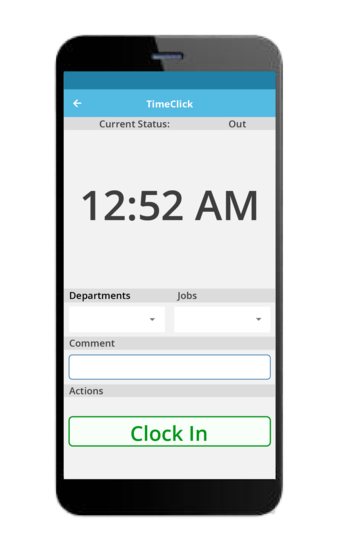
Common Compliance Mistakes to Avoid
You don’t have to be cutting corners to end up in trouble. Even honest mistakes in time tracking can lead to legal headaches and unexpected costs. Here are some of the most common slip-ups small businesses make—and why they can come back to bite you.
| Mistake | Why It’s a Problem |
|---|---|
| Misclassifying employees as exempt | If someone doesn’t truly meet the exemption rules, you could owe years of unpaid overtime—plus penalties. |
| Failing to record off-the-clock work | Work done before or after a shift—or during breaks—still counts. If it's not tracked, it’s unpaid time. |
| Auto-deducting unpaid meal breaks | If employees work through lunch (even briefly), that time must be paid. Automatic deductions can lead to underpayment. |
| Not tracking remote or after-hours work | Answering emails at home? Jumping on a quick call after hours? It all counts as paid time under federal law. |
| Using inaccurate or outdated time records | If your records aren’t complete, you won’t have much defense during an audit or employee complaint. |
| Violating state-specific rules | Some states require daily overtime, extra breaks, or more detailed recordkeeping. Missing those rules can mean double trouble. |
Most of these mistakes are easy to avoid once you know what to look for. With clear policies, a bit of training, and the right system in place, you’ll catch issues before they become problems.
TIMECLICK TIP
TimeClick automatically tracks every punch in and out, flags missing entries, and logs all edits—so you always have a clear, trustworthy record if questions ever come up.
How TimeClick Supports Compliance
TimeClick helps small businesses stay legally compliant while keeping things simple. It gives you the accuracy, control, and documentation you need to meet federal and state labor laws—without creating more work for you or your team.
Accurate Time Capture
Every clock-in, clock-out, and break is automatically time-stamped down to the minute. Whether your employees are working on-site or remotely, TimeClick records their hours with precision, so nothing slips through the cracks.
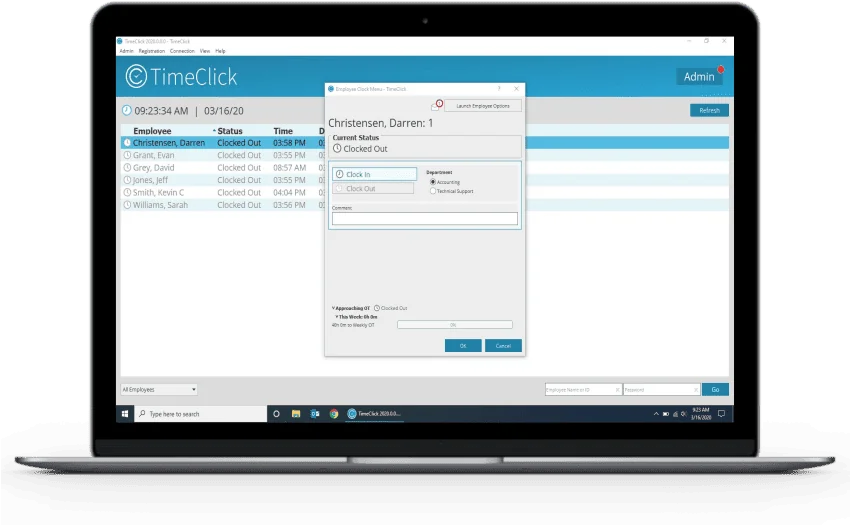
Audit-Ready Records
TimeClick stores all time entries, edits, and user actions. If you’re ever audited or handling a wage complaint, you’ll have clear, organized records that show exactly what happened and when.
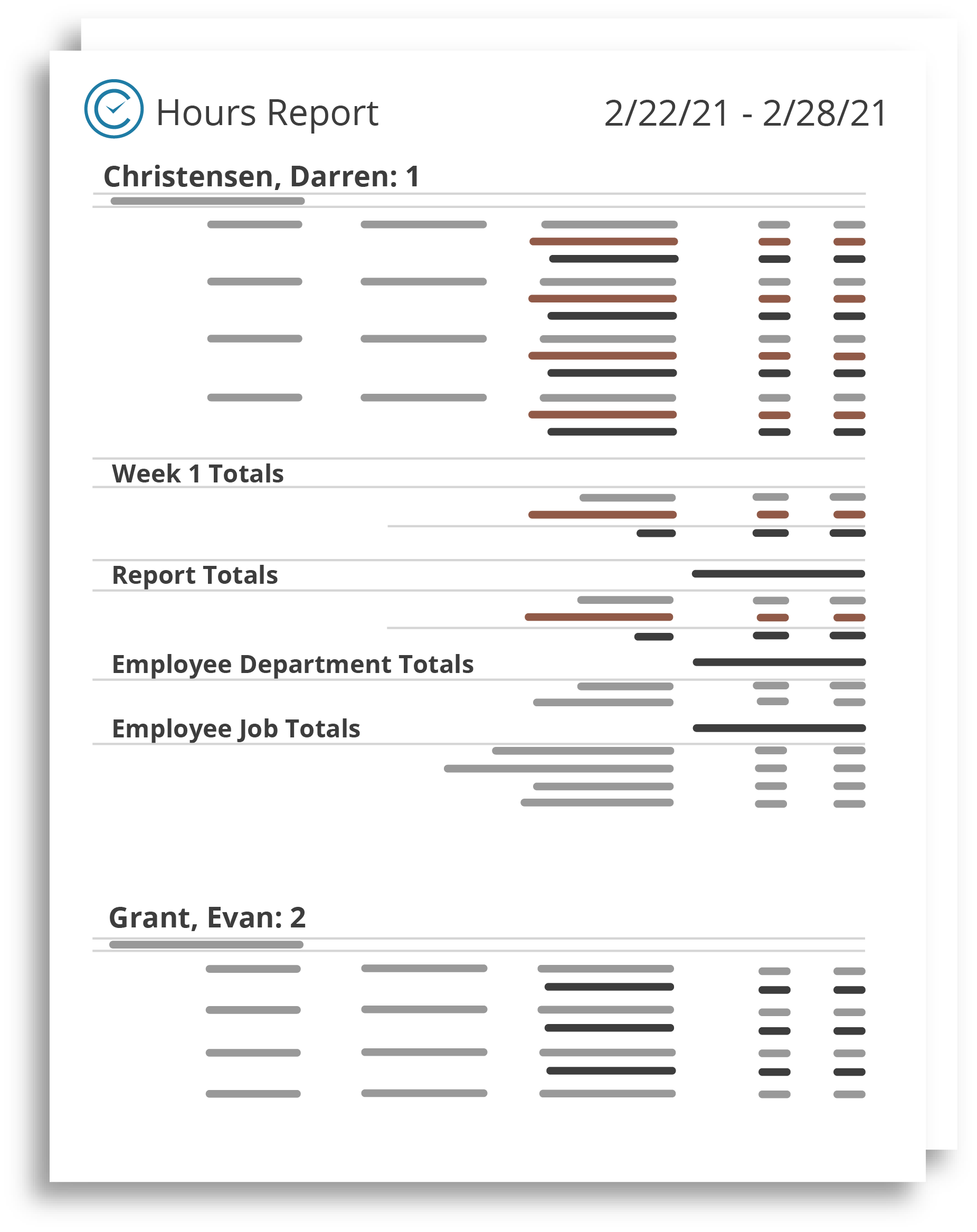
Built-In Rules for Overtime and Breaks
You can configure TimeClick to follow federal and state labor rules—like overtime thresholds or required break tracking. It can flag missing punches or alert you when someone is close to overtime, giving you a chance to fix issues before they turn into problems.
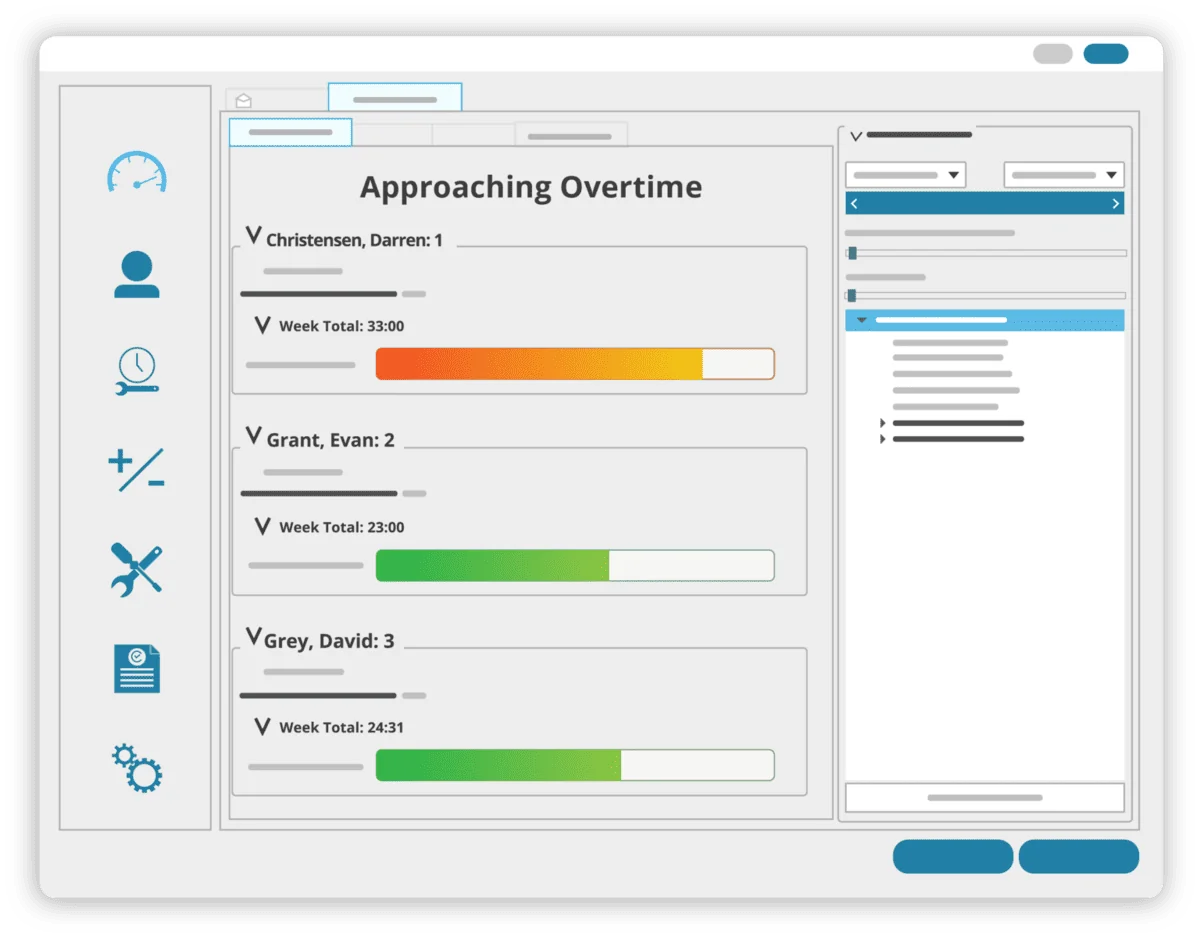
Secure, Centralized Recordkeeping
All your time data is safely stored in one place. No need to dig through folders or old spreadsheets—everything you need is accessible in your dashboard when you need it.
Payroll Integration
TimeClick connects with major payroll software to eliminate manual entry and reduce the chance of payroll errors. Hours and overtime sync directly into your system, making paydays smoother and more accurate.
Frequently Asked Questions
Still have questions? Here are some quick answers to common time tracking and compliance concerns for small business owners.
Do I need to track hours for salaried employees?
Only if they’re classified as non-exempt. Just because someone is salaried doesn’t automatically mean they’re exempt from overtime. If they don’t meet the federal criteria for exemption, you’re required to track their time just like you would for an hourly employee.
Can I round employee time entries?
Yes, but be careful. Federal rules allow rounding to the nearest 5, 10, or 15 minutes—as long as it’s fair and doesn’t consistently benefit the employer. A good rule of thumb: make sure your rounding averages out over time.
How long should I keep time records?
The FLSA requires you to keep payroll records for at least 3 years and time cards or schedules for at least 2. It’s a good idea to hold onto them even longer if your state has stricter requirements.
Can I automatically deduct meal breaks?
You can, but it’s risky. If someone ends up working through part of their break—even if it’s just answering a call—they need to be paid for that time. It’s safer to have employees clock out and back in for meals so the records reflect what actually happened.
What counts as off-the-clock work?
Any time an employee is doing something job-related—before clocking in, after clocking out, or during an unpaid break—that’s considered work time. You’re responsible for paying them for it, even if they didn’t ask for approval first.
Is it okay to use paper timesheets?
Yes, as long as they’re accurate and complete. You’re not required to use software, but paper systems are easier to lose or miscalculate. A tool like TimeClick helps reduce those risks by logging everything and keeping records backed up.
What are the penalties for non-compliance?
If you fail to follow time tracking laws, you could owe back pay, overtime, and potentially double damages. The Department of Labor may also issue fines, especially if the violation is repeated or considered willful. Staying ahead of this stuff is a lot cheaper than dealing with the fallout.
Conclusion
Time tracking compliance doesn’t have to be complicated—but it does need to be handled right. If you're running a small business, having clear records of when your employees work, take breaks, and earn overtime isn’t just smart—it’s required by law.
Between the FLSA and various state rules, there’s a lot to keep track of. But with the right tools and a few consistent habits, you can avoid the most common pitfalls and build a process that works for everyone on your team.
TimeClick helps take the pressure off. It gives you reliable tracking, accurate records, and built-in safeguards—so you can focus on running your business without worrying about compliance issues sneaking up on you.
Take the guesswork out of time tracking. Set your business up for success and stay protected every step of the way.
Ready to simplify compliance and take the guesswork out of time tracking? Try TimeClick and see how easy it is to track hours, manage records, and stay audit-ready.
Start your FREE TimeClick Trial Today.

